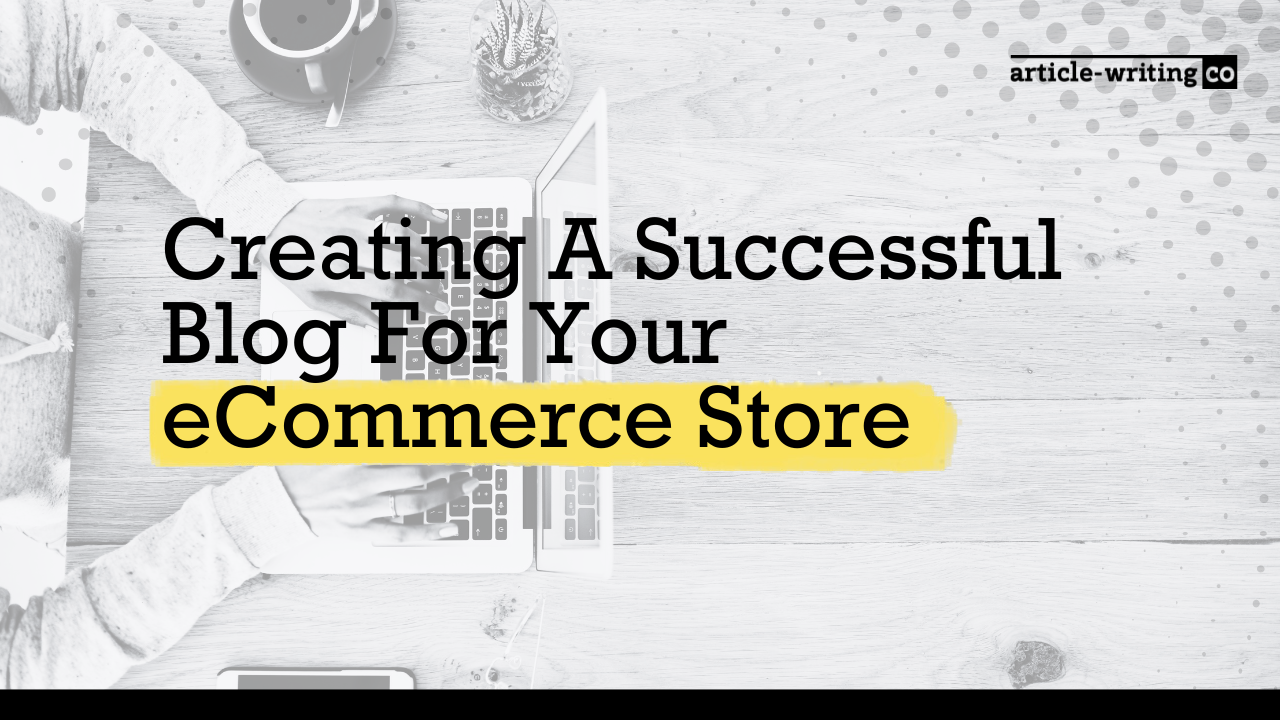Every eCommerce store should incorporate a blog to improve organic traffic and optimize search engine optimization efforts. Ecommerce, for many reasons, is more reliant on blogging for SEO than many other fields. Optimizing for those long-tail keywords is ultimately impossible in most site sections or within a product description, so blogging should be a key part of any eCommerce content marketing strategy.
Starting a blog is hard work. But fortunately, it can pay off. Building up free, organic traffic will allow you to build a more profitable business in the long run. According to Hubspot, companies that published over 16 posts a month averaged about 3.5x more traffic than those who posted under four times a month. Creating amazing ecommerce copy within the blog can drive more traffic to your store which you can convert into loyal customers and sales.
However, a lot of companies may be frustrated when it comes to creating eCommerce content that’s optimized for the search engine, their target audience and reflects their brand’s tone.
eCommerce Blogging Tips From Article Writing Co. Experts
Create a set of guidelines to establish a standard and tone for your blog. Writing eCommerce copy for your blog is hard work.
You should update your eCommerce blog content regularly but you don’t have to do it all yourself. If your goal is to create blog content about 4 times a week (the optimal amount) but you’re a solopreneur, you’ll need to find guest writers or hire an ecommerce copywriter. Since blogging is time consuming, having a copywriter to do copywriting will allow you to focus on customer service, marketing and ultimately running your business.
Whether you choose to do the copywriting yourself or hire a copywriter. It is important to make a routine to remove and replace outdated content to improve your posts. Every time the eCommerce blog copy is updated you can share it with your audience. It’s great for SEO and your customers will love that you’ve kept your content fresh. Another tip to grow your blog traffic and make it more profitable is by running Facebook retargeting ads. These types of ads are also a lot cheaper than most Facebook ads and have a great return.
Optimize your blog content for keyword density. What type of niche content does your customer search for? Use tools like Keyword Planner to help you find the right keywords to optimize your content for. Use keyword research to help you build a strong eCommerce blog foundation.
A refresh and refurbish may be necessary here, and we’ve reached out to eCommerce experts to talk about their thoughts on blogging, and about their eCommerce copywriting process to achieve long-term success.

Do you think blogging for e-commerce is “dead?”
No, I do not think blogging for e-commerce is dead. The reason is, blogging or e-commerce is an easy way to rank your website for long tail keywords that product pages simply cannot rank for. For example, say you write an article about the best anniversary gifts and the search volume is high, but the competition is even higher. Most companies will use PPC or concentrated SEO strategies to rank for a keyword like this. However, if you write content like Best Anniversary Gifts for Him and/or Best Anniversary Gifts for Her, you can reduce the competition but still attract users who are lower in the conversion funnel. No category or product page is going to have the ability to rank for a keyword like that.
As long as your content is wholesome and researched, your website has topical relevancy to a user’s keyword query and you have a dedicated SEO strategy to rank your blog – your blog will never die.
William Chin
Web Consultant
Bumblebee Linens
Blogging for eCommerce is far from dead! When used correctly, it can be a great asset for both your website and your customers. At First Mats, around 20% of our organic traffic is generated from Blog articles but what’s more important is that these blog posts are targeted around specific topics that the customers find really useful. In short, a blog article can be used to answer questions related to your products and if these questions are regularly searched for on search engines, then you can expect to receive a lot of traffic on the back of it.
Richard O’Connor
Strategic Marketing Director
First Mats Ltd
Blogging has always been an essential part of marketing and so won’t say that it is dead. However, more personalized content is preferred these days and therefore, the blogs that have reviews or opinions from real people who have actually purchased online and used the products are in vogue.
Also, I believe emails are more preferable for eCommerce businesses as a marketing tool since they can be personalized for each visitor on the eCommerce website. Special offers related to the items searched or selected by the visitors/customers can be targeted specifically in the emails.
Krishna Jani
Senior Content Writer
Orderhive
What sources do you use for blog post inspiration?
Inspiring creativity is about supplying your brain with the building blocks needed to make innovative new associations and spark creative ideas. The quickest way to do this is via the SubMerge technique that follows this simple process:
- Create a list of anchor topics you want to be creative with. This could relate to a specific product you want to sell, for example.
- Create an associated list of related terms for each topic (usually a straightforward Google search on the term will surface a good amount of related terms)
- Merge each associated list with each anchor topic.
Not every combination of anchor and associated topic will work well. Some concepts will be too closely related and won’t inspire unusual associations.
Many, however, will be loosely related. Your brain will have to jiggle and tweak the concepts to merge them into a workable new title.
David Mercer
SME Pals
The primary sources I use to come up with topics for blog posts are Google Keyword Planner, Answer the Public and Quora. In addition to the organic traffic from Google (i.e. SEO), I utilize Facebook ads to drive some visits to my eCommerce blog posts. To make the articles more effective, I make sure to add an infographic or a summary image at the end, which encourages sharing and linking.
Hassan Alnassir
Founder and Owner
Premium Joy

How do you help drive further traffic to your e-commerce blog posts?
The target is to get my blog ranked on featured snippet (Zero ranking) to get the maximum traffic against a particular keyword. For that, I aim to rank my blog between 1 – 7 on SERP. To rank the blog on the first page I do email outreach to get backlinks from authoritative websites.
Bilal Uddin
Content Strategist
Within The Flow
Social media is an obvious response, but this is not the only thing we do. We link to our blog posts from the related product catalogs and we directly refer those posts to our customers, whenever we see they have trouble choosing the right part. For example, last month, our customer had problems deciding on the right cutter teeth model. We referred him to our post: Buyer’s Guide to Cutter Teeth, which helped him identify the right model fitting his equipment. If it wasn’t for our post, he would have purchased the wrong part and incurred high transport costs. He found the guide so useful, he shared it within his entire organization.
Edyta Garcia
Online Content Marketer
ShipSupport
Creating a great Instagram-centric content page does wonders. You can
leverage your existing Instagram following with an attention-grabbing
story, then direct people to your blog from there. It’s a great entry point
to drive longer engagement on your site and, eventually, get them to a
product page.
Cara Hogan
Content Strategist
Zaius
What content do you use to supplement your blog posts?
Hands-on reviews with unique research are the gold standard of e-commerce blogging. If you can test the product yourself and give results on its performance, you instantly gain more trust and credibility.
Dan Jones
Owner
Terrarium Tribe
I also write about other topics that do not include my products, but that are complementary to it and interesting to my target audience. My product has to do with women’s fashion, so I also write and share about beauty products and natural health options. Women that are into fashion are generally interested in beauty and a healthy lifestyle as well. It’s a nice mix to keep your readers coming back.
Gina Fagnani
Owner
Fabulous Creations
Great custom images and user pictures are great to supplement your blog posts, especially on social media. Make yourself stand out with great tips, images, and blog content so that your target audience sees a variety of reasons to like you and go to your website.
Kimberlee Leonard
Owner
Sensible Copy and Consulting
Know your focus
You have learned from various experts about their tips and tricks to optimizing ecommerce copywriting and on ways to advertise your content online. Let’s do a little refresh. When you’re starting out with blog writing, you must understand your target audience and what they are interested in reading about. The secret to becoming a great eCommerce copywriter is knowing what your readers want, but also passing on that information to them in a way that they find most valuable. It’s important to be realistic and if you don’t have the time to allocate to copywriting, there is no shame in hiring an expert eCommerce copywriter to help! Here at Article-Writing.co, we just might have the right writer for your business.

David is the Founder and Director of article-writing.co, the fastest-growing content creation agency in North America. He has transformed companies by offering high-quality content that has impacted their SEO ranking, revitalized websites with engaging and industry-relevant blogs and website copy, and championed successful email campaign copy.




